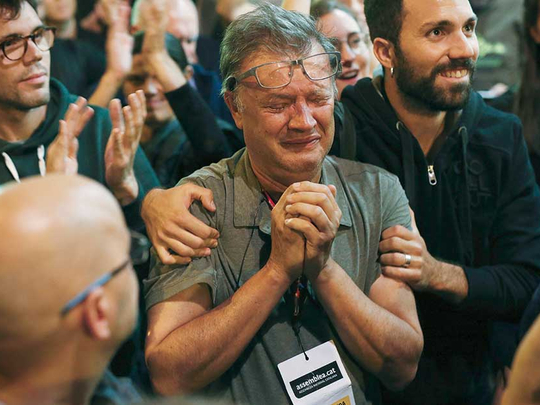
Barcelona, Spain: Sunday’s Catalan independence referendum has opened a deep political schism between Madrid and the region around Spain’s second-largest city.
Catalan officials say that 2.26 million defied the central government’s best efforts to frustrate them and cast ballots in the disputed plebiscite — and more than 92 per cent voted in favour of the region, which accounts for roughly a fifth of Spain’s gross domestic product, going its own way.
Officials in the local health ministry say that nearly 900 were injured when the federal police, the Guardia Civil, fired rubber bullets, wielded batons and forcibly removed voters from polling stations. Some 30 officers were also injured in the violence that has shocked Spanish and Catalans alike.
“The Guardia Civil were always [former dictator General Francisco] Franco’s bully boys,” one woman told Gulf News yesterday. “Now they’re [Spanish Prime Minister Mariano] Rajoy’s bully boys.”
Rajoy had raised the stakes in the weeks leading up to the referendum, ordering extra Guardia Civil into the region to augment the Catalan regional police, the Mossos d’Esquadra as well as the Policia Local, Barcelona’s city police. Both local forces were not involved in Sunday’s violence. The Guardia Civil also clashed with local firefighters and protesting farmers as the police returned to billets on two ships docked in Barcelona port.
Because of the violence, the scheduled La Liga football game between Barcelona and Las Palmas was played in an empty stadium. The visiting team had insisted that its strip would also feature a Spanish flag as a sign of unity with the Madrid government.
Barcelona defender Gerard Pique said he is ready to stand down from international duty with Spain if he is deemed a “problem” by the national team coach or the Spanish Football Federation as a result of his support for Catalan independence.
Pique was pictured casting his vote in the election earlier in the day.
“You vote yes, no, or leave it blank, but you vote,” the Barcelona-born defender said. “In the Franco era we couldn’t defend our ideas. I am, and I feel Catalan, and I am very proud of the people, of their behaviour, like in the last seven years.”
Pique, who was also critical of the prime minister, Rajoy, continued: “After what has transpired it has been my worst experience as a professional. It has been a tough day. There were families, children and grandparents, and the police and Guardia Civil have intervened.
“The people protested without violence. I thought they would try to stop the vote in a peaceful way. Everyone has seen what happened. They’ve made things worse. This is among the worst decisions in the last 50 years. They’ve separated Catalonia from Spain even more and there will be consequences.”
Despite calls from Catalan authorities to condemn the brutal police crackdown on their independence referendum, the European Union (EU) and most member states were reluctant to respond formally, seemingly viewing the dispute as an internal Spanish matter.
Belgium’s prime minister, Charles Michel, was among the few national leaders to denounce the violence.
“Violence can never be the answer!” Michel said on Twitter. His Slovenian counterpart, Miro Cerar, expressed his concern, saying he was “concerned” and calling for “political dialogue, rule of law and peaceful solutions”.
Former Belgian prime minister and senior MEP Guy Verhofstadt also said that while he did “not want to interfere” in Spain’s domestic affairs, “I absolutely condemn what happened today in Catalonia”. It was “high time for de-escalation,” he said.
In Britain, the prime minister, Theresa May, faced mounting calls to speak out against the scenes of police brutality after Labour, the Scottish National Party and the Liberal Democrats all criticised the Spanish government.
Human right groups also condemned the violence. Human Rights Watch said the state “has a duty to protect the rights to peaceful assembly and free expression” both of those opposed to independence and those who supported it.
Labour’s Jeremy Corbyn said the police action was “shocking” and called on the Spanish government to “act to end it now”.
Nicola Sturgeon, the Scottish National Party leader, also said she was concerned and that people “should be allowed to vote peacefully”. The vote is of particular interest in Scotland, which in September 2014 voted in its own heated but largely peaceful independence referendum to remain in the UK.
— With inputs from agencies












